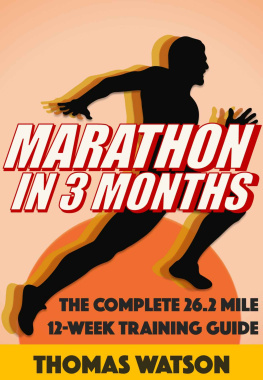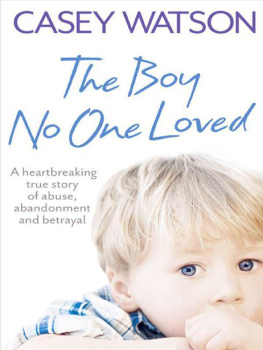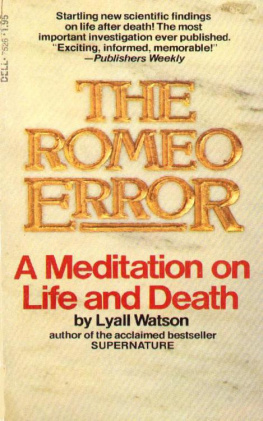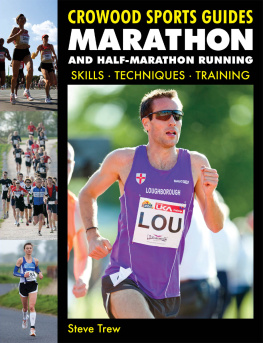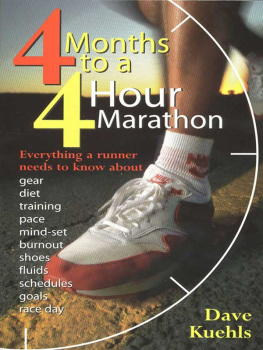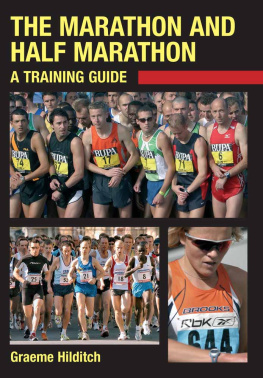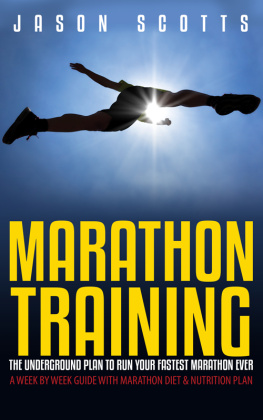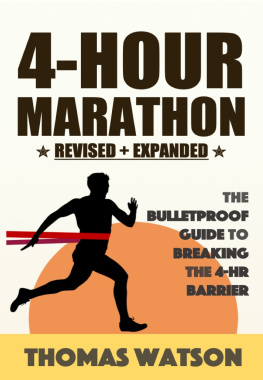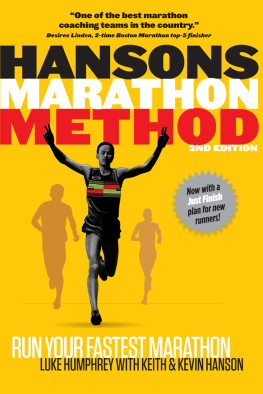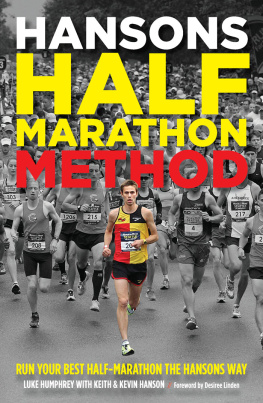MARATHON IN 3 MONTHS;
THE COMPLETE 26.2 MILE 12-WEEK TRAINING GUIDE
Thomas Watson
Published internationally by Broadsea Press
Thomas Watson
Terms and Conditions:
The purchaser of this book is subject to the condition that he/she shall in no way resell it, nor any part of it, nor make copies of it to distribute freely or for consideration whether in electronic format or otherwise.
Medical Disclaimer:
All information in this publication is the advice and recommendations of and personal to the author and is not meant to replace that of a medical professional. Before partaking in any training or physical activity, the reader should consult with his or her medical professional.
Table of Contents
I ntroduction
The length of time required to properly prepare for a marathon depends on three main factors.
The first is the runners base fitness level. If shes a couch potato, the road to a marathon start line is very long, with several important milestones along the way. If, on the other hand, she already runs 10km every other day, then her body is well primed and increasing her training to prepare for a marathon is very feasible.
The second factor is the quality and effectiveness of the marathon training. A good training regime should stretch the runners ability to a level where they feel challenged, without incurring injury or burnout. It should increase the weekly mileage in manageable but significant increments, and also balance the requirement for rest periods. It should be adapted to the needs of the individual runner and incorporate their personal life and other activities.
The third factor that affects the length of time required to train for a marathon is the runners goals. If she is only looking to complete the marathon, then her training can focus on building mileage. If the runner wants to beat a certain time barrier say 4 hrs - then her training has to incorporate a lot of pace work which takes more time.
*
This book isnt for people looking for a short-cut to the finish line, nor is it a life hack on how to run a marathon with minimal training.
This book is a guide on how to train and prepare for a marathon in a relatively short time period. The method outlined is actually very achievable if you can complete the necessary training.
Like a lot of things in life, you cant wing running a marathon. If you think you might somehow get lucky on the day and book a good result - like fluking a shot at a dartboard then youre in for disappointment. And pain.
A runners performance on marathon day tends to be a pretty direct reflection of the amount of training and preparation he or she has invested in the months leading up to the event. There are pitfalls to avoid such as injury, or hitting the wall, or ruining your stomach with too many energy gels.
This book is about how to train effectively and smart how to structure your training to quickly build your mileage, and strategies to use on race day to get around comfortably. It is about maximising your chances of running a successful marathon.
*
Back in 2012 I signed up for my first ever marathon three months before the event then committed to training. I had been an amateur runner but had never done anything more than a half marathon before. And I certainly wasnt in marathon condition when I signed up. But over those three months I trained diligently, working on my mileage and pace and following almost the same programme as the one Ive included later in this book.
On the day, I was strong until around the 35km mark, then hit the wall in extraordinary style. It was a huge shock to the system I felt terrible and was ready to drop out of the race. Instead I dug deep and managed to pull my feet over the finish line in 3hrs 58 min. In the end, Id gone out way too fast, and suffered for it in the last few miles of the marathon. Id also stubbornly ignored other runners advice on fuelling and energy levels, thinking of myself as a naturally fuelled runner. I learned a lot about pacing strategy and nutrition that day, and have refined my approach over the dozens of marathons Ive run since.
So, can a marathon be run after only three months of training?
Yes, it can although if youre not already a regular runner, you may struggle to cope with the required training regime. Assessing your current level of fitness, and your suitability forrunning a marathon, is discussed in the upcoming Training chapter.
Having now run dozens of marathons, I have refined my main principles for marathon preparation with a short time frame. The key principles for marathon preparation that I expand on throughout this book are:
- Design A Robust Training Plan (and stick to it from day one);
- Stay Injury Free (even if it means taking a day off);
- Train based on Time spent running , not pace (to get used to long runs);
- Get the Right Gear.
The marathon is a major challenge. Youve got an uphill battle ahead of you, but also the lure of the finish line... so Im here to help you along the way. Ive intentionally kept this book short and light on anecdotes and stories. Instead Ive tried to focus on relevant and practical guidance. It should include everything the first timer needs to train and prepare for their marathon.
Heres what were going to cover in the chapters which follow:
- Getting started. We look at the mental and physical commitment youve made, what to expect and how best to prepare yourself in the coming three months.
- Training. We dive into detail on how to get from your current state to race-ready in twelve weeks. This includes assessing your current level of running fitness, and how feasible a marathon in three months is. Marathon training these days is a science, not an art and the lessons learned from countless other runners can be de-constructed and applied to your own training. Example training plans are included here.
- Shoes and gear. Have the correct shoes and running gear is fundamental for success. We break down every piece of gear you need to run a marathon, and all the optional extras too. We discuss what to look for when youre buying shoes, shorts and everything else.
- Nutrition and Hydration . Fuel is what gets you round the race, but it comes in many different forms and everyones stomach is different. We look at the various fuelling options to have before and during a race, as well as discussing your fuelling strategy and how to road-test it before the race.
- Before The Marathon. We explain where your focus should be at various milestones 4 weeks before the race, 1 week before the race, the night before the race and the morning of the race. Here we discuss tapering and cross-training, diet and mental preparation so you get to the start-line in optimal condition.
- The Marathon. The actual marathon is the culmination of all your training in one event. Here we go through what to expect on the day itself this section contains a lot of advice and tips from experienced marathon runners.
- Post-Marathon. What to expect, how to minimise recovery time and how to retain your new level of distance running ability.
Enjoy, good luck, and run far!
- Thomas @ Marathon Handbook
Chapter 1: Getting Started
What to Expect
The journey to the finish line of a marathon is like any great one its long, it requires a lot of effort and pain, there will be setbacks and failures but there will be transformation involved, and the reward at the end directly correlates to the amount of effort you put in.
The act of training for and running your first marathon is a voyage of discovery.
You are pushing your body farther than it has gone before. Mentally, you will see how you react when faced with fatigue, drained motivation and continuous discomfort.
Next page
